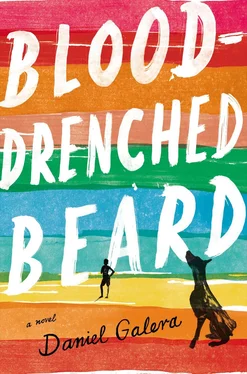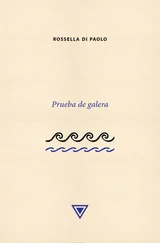He gets up a while later, not really sure if he dozed off or not. Something important has changed in the atmosphere, but it is hard to tell what. The clouds have grown thicker, and the dusk is colorless. The fog has disappeared. He looks at the horizon and feels a chill run down his spine. A terrifying storm is gathering out at sea. Dark clouds rise up like mountains advancing toward the beach, an ominous wall that extends along almost the entire visible horizon, but something about it doesn’t seem right. The storm moves and doesn’t move at the same time. It changes shape, but the transition from one state to the other can’t be perceived. The more he looks, the more unsure he is that they are storm clouds. There is no lightning or thunder. The dark mountain range is mirrored by the horizon and deformed here and there as it compresses and stretches. Its shapes appear both close and blurred by the distance. They are somewhat holographic. If they are as close as they look, he’ll be engulfed by a typhoon before he can run to shelter. If they are as distant as they also look, they must be of gigantic, otherworldly dimensions. He thinks he might be watching a tidal wave roll in. The effect of an apocalyptic meteorite in the heart of the Atlantic. The end of the world approaching in silence. He is hypnotized as he watches the phenomenon change shape, float, always looking like it is arriving without drawing any closer. Shortly before nightfall the vision begins to fade and disappears uneventfully.
• • •
S tudents start showing up in the afternoon at the pool. Some are surfers and tend to have poor technique but excellent fitness, good students to work with as long as they accept that there is room for improvement. This is the case with Jander, a short, stocky, bald guy of about forty who is always sunburned and owns a roadside pet shop and kennel in Palhocinha famous for housing some of the town’s most beloved dogs when their owners are away. Jander surfs, swims, runs, and rides a bike regularly, but without any supervision or method. His incredible endurance is wasted with an ungainly swimming style, and his first few lessons are devoted to trying to make his reddish body turn less in the water and to better synchronize his arms and legs. There is a strapping young Rastafarian surfer named Amós, but he is always off his face and refuses to take any advice. He stops, listens, agrees, and then ignores all instructions. His impermeable hair doesn’t fit in his swimming cap, but Saucepan’s orders are to turn a blind eye. He uses up all his energy in the first two or three sprints of each set and then straggles through the rest of the session, breathless, swallowing water, swimming slower and slower and with ever-more visible suffering. On the third week, a pair of introverted teenage twin girls enrolls, Rayanne and Tayanne, who arrive together, swim bureaucratically with identical black bathing suits on very white, almost identical bodies, and leave together. He tells them about his problem with faces because they suffer from the inverse problem of not being immediately recognized by most people. He thinks it is funny, but they don’t. Two students are triathletes. One is professional, swims like a missile, and comes with his preprepared session written in blue pen on a small white piece of paper that he always leaves stuck to a tile on the edge of the pool when he goes. He doesn’t ask for or need his attention. The other one is a rheumatologist who has seen better days as an athlete. He always brings giant hand paddles that he insists on using every session despite the fact that they are the obvious cause of his constant shoulder pain, probably tears in his supraspinatus tendons. But he’s the doctor. There are two students who can barely stay afloat. One is a corpulent, hairy, bearded man who likes to clown around and showed up on the first day laughing and asking if he could swim in his tracksuit. He calls himself Tracksuit Man and gets a laugh from the twins when he announces his Special Weapon, the Dive Bomb, then leaps into the pool as dramatically as possible. The other one is Tiago, a polite, shy, hard-working seventeen-year-old with a severe case of gynecomastia. His favorite student so far is Ivana, a friendly, plump little woman in her early fifties. At first Ivana struck him as the sedentary sort, but she has proved to be an experienced and dedicated swimmer. She occasionally participates in the Santa Catarina short-distance swim circuit and is interested in training for longer distances. She is a public prosecutor and works in the Garopaba Courthouse. She is one of those people for whom swimming is not a means to an end such as losing weight, curing a disease, or winning medals; rather, it is as much a part of her life as working, eating, and sleeping. She is someone who can’t not swim. In that, they are the same. Swimming for them is a special relationship with the world, the kind of thing that those who understand it don’t need to talk about. Ivana swings her shoulders in an odd way, and he recognizes her by her walk.
At times he isn’t sure of the identity of a new student. Sometimes someone comes in just to look at the pool or ask for information, and he thinks it’s a student he knows. Instead of explaining his problem, he prefers to let people think he is forgetful, strange, absent-minded. Some think he is a misanthrope. But in that small, three-lane pool with his handful of students, misunderstandings are rare and short-lived, and there are no hard feelings. He likes meeting new people, starting a whole set of social relations all over again. He ignores faces and learns to recognize people by their attitudes, problems, stories, clothes, gestures, voices, the way they swim, the progress they make in the water. Their characteristics congeal to form a diagram that he can evoke and study in his free time. Each person has a recognizable pattern that he can situate on an imaginary panel with a little sign underneath saying: MY STUDENTS. He keeps many such pictures in his head. His picture of Academia Swell also includes Débora, who insists she is going to teach him to surf, and Saucepan who, as well as being a partner in the gym, also works as a pizzaiolo at a gourmet pizzeria at the entrance to the town, a jovial sort with a shaved head and well-defined muscles who is an enthusiastic spokesman for his undertakings day and night and puts in an appearance at every social event in town. His partner in the gym, Spatula, is an international kite surfer who spends much of his time abroad. Sometimes Spatula comes to swim in the pool at night, after he has already left. Débora assures him that they have already met at some point, but he doesn’t remember. Spatula sent a message to say that he doesn’t want any dogs on the gym premises, but Saucepan doesn’t mind having Beta lying on the cement floor in front of reception or being patted by students on the lawn near the front gate. He has told Débora to tell Spatula that if there really is a problem, to come and speak to him directly instead of sending messages through others.
Prohibited by the fishermen from swimming in the ocean since May 1, which marked the beginning of the mullet-fishing season, he swims in the pool before lunch or runs on the beach or dirt roads of Ambrósio and Siriú, passing rural properties overshadowed by fig trees, pigs running loose, and smooth dunes crisscrossed with the marks of sandboards. One cold morning he witnesses the first big mullet haul of the year on tiny Preguiça Beach. Dolphins follow the shoals, displaying their dorsal fins and leaping joyfully, guiding the boat as it moves in on its prey. Two dozen fishermen surrounded by a flurry of gulls drag in the nets teeming with plump, terrified fish with straight rows of silvery scales and bellies gleaming like molten lead, which are piled up on the sand until they form an inert mountain, working their gills in vain as they wait for death. A shirtless young fisherman has “Joseane, Tainá and Marina, The Stars of My Life” tattooed across his back. A drunk with white whiskers and bulging eyes pulls in the net, in a trance. An older fisherman oversees the work with a disdainful air born of decades of experience at sea. They all take the job very seriously and don’t crack jokes or chat, limiting conversation to practical interjections. Cats and dogs prance around the nets, and the more experienced ones grapple with the heads of the smaller fish discarded by the humans. The local dogs treat Beta with hostility, and she has already learned to keep her distance from them. He helps the fishermen pull in the net and is given two fresh mullet, which he cleans on the rocks using his father’s knife. He sets aside two steaks to pan-fry with a little olive oil and lime and freezes the rest. Later that afternoon, after picking up Pablo from school and leaving him with Dália’s mother, he returns home to find four launches moored in front of the fishing sheds near the remains of an almost eleven-ton haul. People are finishing loading the fish in white plastic tubs into two small refrigerated trucks. Locals cart off their quota of fish hooked over their fingers by the gills or in plastic supermarket bags. In spite of the large quantity of mullet caught this day, the fishermen are pessimistic and fear the worst season in years. Some blame the temperature, others the huge amount of rain in Patos Lagoon. The street lighting comes on, and there is a soft red glow in the west behind the hills where the sun has set. A sudden silence settles over the bay after everyone has gone, and for a while the only sound is the waves, until someone decides to play electronic music from the open trunk of a car parked on the waterfront.
Читать дальше












